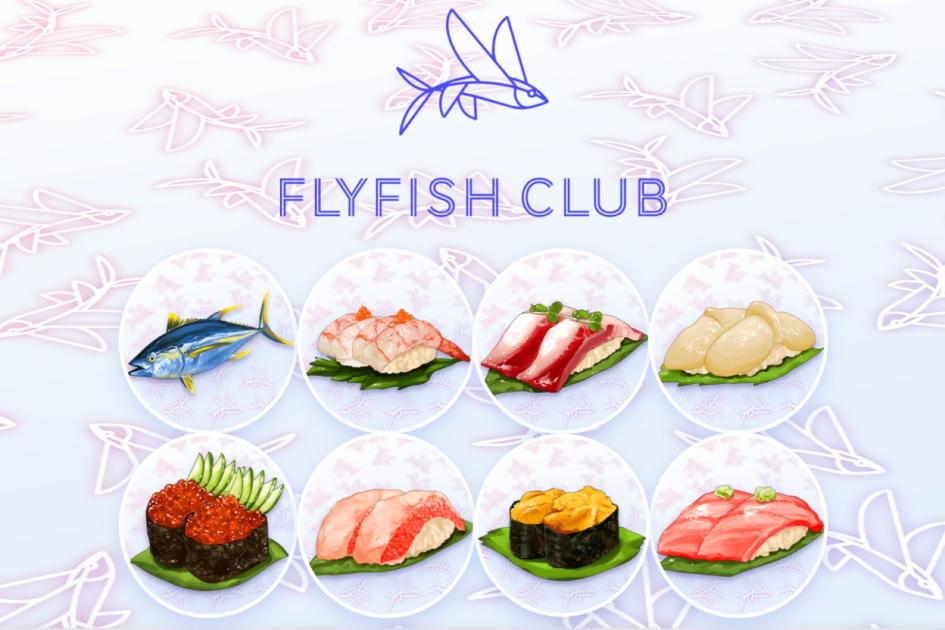
World’s First NFT Restaurant a “Remarkable Innovation”
The first NFT restaurant will open in New York City next year. The groundbreaking news was announced by hospitality company, VCR Group, fronted by Resy entrepreneur Gary Vaynerchuk, last week.
The members-only restaurant, called Flyfish Club, is open to those who purchase a Flyfish non-fungible token, a unique digital asset stored on the blockchain and purchased using cryptocurrency. A regular membership token with access to a cocktail room and dining room costs about $13,600, and an exclusive tier, with access to a private omakase room, costs roughly $29,500, reports The Washington Post. The tokens can be bought, sold and leased by owners on the secondary marketplace, Opensea.io.
Inside the exclusive 10,000-square-foot space in a prime retail site yet to be revealed, guests will be able to dine on a ‘seafood focused’ menu, with influences from Peru and Japan, to New England-style seafood in the main dining room. A limited membership will have access to a 14-seater private omakase room showcasing fresh fish flown in daily and curated by a Michelin-star sushi master.
The newly announced venture sold out over 1,000 memberships in less than a minute, raising an initial $14 million earlier this year, and already has a 15,000-person active Discord according to David Rodolitz, the co-founder and CEO of VCR Group, and founding partner of Empellon Restaurant Group. Rodolitz says they’re already seeing a community of crypto, NFT and food and drink enthusiasts getting to know each other, in a space where ‘social currency’ is king. In as little as five years time, he believes we’ll live in a world in which our ‘digital wallets’ will reveal more about who we are than our social media or Linkedin accounts.
Unlike NFT art, this project is focused on utility. “We have hoped and encouraged people buying the tokens to use them, not just for potential appreciation,” Rodolitz explains. The group has even held back a bunch of tokens, to ensure that members will ideally be able to frequent the club multiple times a month and even lease their membership when they’re out of town. Unlike the membership fee, food and drink inside the club will be paid for in good old-fashioned USD. “We’re going to be sourcing and providing a very high-level experience and the freshest ingredients from around the world. It’s not going to be apologetic when it comes to pricing, it’s also not going to be egregious,” says Rodolitz of the expected menu price point.
From a business perspective, the unconventional move arrives at a time of huge challenges in an industry battered by the ongoing Covid storm, compounded by rising costs, inflation, and supply chain issues. The NFT model disrupts the conventional ‘EBITDA’ (earnings before interest, taxes, depreciation and amortisation) model of making money in the restaurant industry, or the “losing proposition”, as Rodolitz calls it.
Instead of a restaurant making money by hoping that their revenue exceeds their expenses, the group have discovered what Rodolitz calls a “remarkable innovation”, which sources funding in advance. “We found a new, modern way of creating a new financial model around food and beverage, which creates a little less vulnerability.” In what would appear to be a win-win model for both restaurateur and customer, Rodolitz explains that businesses can potentially hire better talent and occupy a more sought-after space with higher rent, yet the consumer doesn’t end up footing the costs, even if food and vendor costs continue to rise.
“It creates a completely new revenue model for us, it gives people the control and ownership over something which has never been done before in a membership-style environment, and I would argue that it allows us to create more value for everyone that’s involved in our system, because I’m not just relying on restaurant EBITDA. We’re more financially healthy, which will make our projects more sustainable and scalable over time,” he says.
Over one million dollars worth of warm-up events are already scheduled in 2022 prior to the opening of the membership space, offering added value to the token holder, including a pop-up event in the Hamptons and wine tastings with founder and co-owner Gary Vaynerchuk.
As for the future, they not only expect longevity from their members, whom they anticipate holding onto their tokens for years, if not forever, they are also in this for the long run, with “meticulous plans” that they plan on executing over the next 20-30 years. They also have ambitions to replicate Flyfish in other like-minded cosmopolitan markets and cities, both domestically and globally.
When it comes to the future of NFTs, Rodolitz thinks they have the power to disrupt all nature of industries, from hotel groups to developers and real estate. “I don’t think NFTs are going to go away. We’re talking about the authentication of ownership and the ability to transfer ownership in an efficient way. That’s ground-breaking. Being able to validate and transfer an asset is a remarkable innovation,” he enthuses.
But as for now they’re doing things the old-fashioned way, building their business from the ground up, one block at a time, ”We need to have people’s trust to do further Flyfishes. We’ve got big goals, but they are only attainable by staying focused today and executing very specific and granular to-do lists, every single day.”
This content was originally published here.


